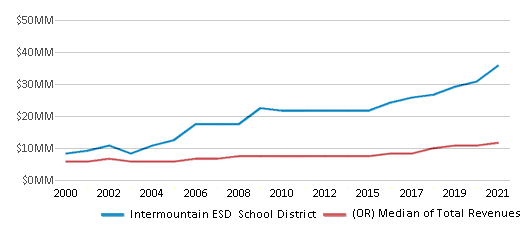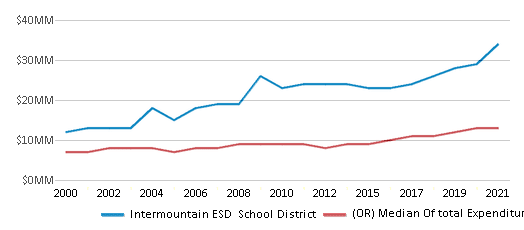For the 2025 school year, there is 1 public school serving 207 students in Intermountain ESD School District.
Public Schools in Intermountain ESD School District have a diversity score of 0.41, which is less than the Oregon public school average of 0.60.
Minority enrollment is 24% of the student body (majority Hispanic), which is less than the Oregon public school average of 42% (majority Hispanic).
Overview
This School District
This State (OR)
# Schools
1 School
1,302 Schools
# Students
207 Students
541,703 Students
# Teachers
3 Teachers
29,489 Teachers
Student : Teacher Ratio
69:1
69:1
Students by Ethnicity:
Diversity Score
0.41
0.60
# American Indian Students
8 Students
6,222 Students
% American Indian Students
4%
1%
# Asian Students
n/a
22,114 Students
% Asian Students
n/a
4%
# Hispanic Students
28 Students
140,608 Students
% Hispanic Students
14%
26%
# Black Students
n/a
12,826 Students
% Black Students
n/a
3%
# White Students
157 Students
312,965 Students
% White Students
76%
58%
# Hawaiian Students
1 Student
4,696 Students
% Hawaiian Students
1%
1%
# Two or more races Students
11 Students
39,453 Students
% of Two or more races Students
5%
7%
Students by Grade:
# Students in PK Grade:
-
-
# Students in K Grade:
4
35,446
# Students in 1st Grade:
6
38,201
# Students in 2nd Grade:
7
40,364
# Students in 3rd Grade:
8
39,761
# Students in 4th Grade:
5
41,356
# Students in 5th Grade:
4
41,259
# Students in 6th Grade:
16
41,436
# Students in 7th Grade:
9
41,680
# Students in 8th Grade:
24
42,445
# Students in 9th Grade:
32
44,713
# Students in 10th Grade:
27
46,380
# Students in 11th Grade:
26
44,723
# Students in 12th Grade:
39
43,939
# Ungraded Students:
-
-
District Revenue and Spending
The revenue/student of $205,498 is higher than the state median of $18,279. The school district revenue/student has grown by 138% over four school years.
The school district's spending/student of $163,082 is higher than the state median of $19,325. The school district spending/student has grown by 138% over four school years.
Total Revenue
$43 MM
$9,902 MM

Spending
$34 MM
$10,468 MM

Revenue / Student
$205,498
$18,279
Spending / Student
$163,082
$19,325
Best Intermountain ESD School District Public Schools (2025)
School
(Math and Reading Proficiency)
(Math and Reading Proficiency)
Location
Grades
Students
Rank: n/an/a
2001 Sw Nye Ave
Pendleton, OR 97801
(541) 966-7868
Pendleton, OR 97801
(541) 966-7868
Grades: K-12
| 207 students
Frequently Asked Questions
How many schools belong to Intermountain ESD School District?
Intermountain ESD School District manages 1 public schools serving 207 students.
What is the racial composition of students in Intermountain ESD School District?
76% of Intermountain ESD School District students are White, 14% of students are Hispanic, 5% of students are Two or more races, 4% of students are American Indian, and 1% of students are Hawaiian.
What is the student/teacher ratio of Intermountain ESD School District?
Intermountain ESD School District has a student/teacher ratio of 69:1, which is higher than the Oregon state average of 18:1.
What is Intermountain ESD School District's spending/student ratio?
The school district's spending/student of $163,082 is higher than the state median of $19,325. The school district spending/student has grown by 138% over four school years.
Recent Articles

Year-Round Or Traditional Schedule?
Which is more appropriate for your child? A year-round attendance schedule or traditional schedule? We look at the pros and cons.

Why You Should Encourage Your Child to Join a Sports Team
Participating in team sports has a great many benefits for children, there is no doubt. In this article you will learn what those benefits are.

White Students are Now the Minority in U.S. Public Schools
Increasing birth rates among immigrant families from Asia and Central and South America, combined with lower birth rates among white families, means that for the first time in history, public school students in the United States are majority-minority. This shift in demographics poses difficulties for schools as they work to accommodate children of varying language abilities and socio-economic backgrounds.





